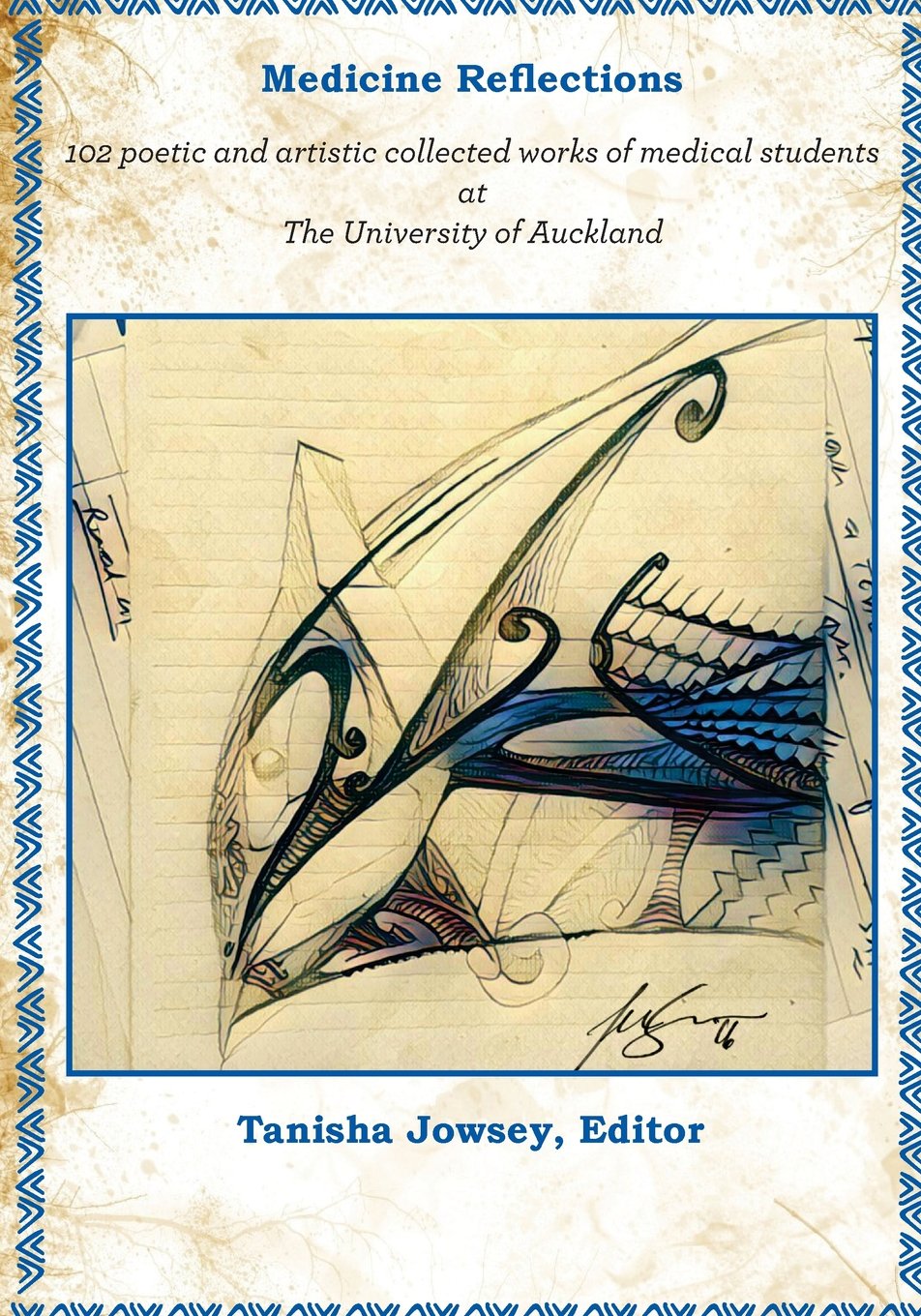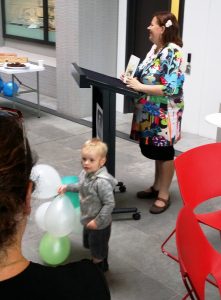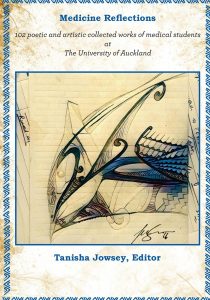A project encouraging critical writing and creative thinking
This project’s resources were originally developed for medical students at the University of Auckland, by academic Tanisha Jowsey.
These resources might be useful to: teachers of creative writing, teachers of the arts in medicine, psychological medicine and narrative medicine.
The project was supported by the SEED Fund grants for 2017.
Watch Tanisha discussing this project at the 2017 CLeaR Teaching and Learning Symposium here.
For similar projects, see: Liquid Writing and The Three Lamps.

Project background
“…This book makes clear that our future doctors have heart. It speaks through the beat of poetry and the beauty of art.”
– Prof. Helen Sword, author of Stylish Academic Writing
As Tanisha Jowsey explained in her initial application, as part of the medical curriculum at the University of Auckland, students must prepare reflective portfolios. They are required to prepare ‘evidence’ of their critical reflection for each of the five themes included in the domain, one of which is professionalism and reflective practice. One element upon which the portfolios are assessed is creativity and engagement. Students in previous years have demonstrated high levels of creativity and engagement through various mediums, but most commonly through narrative medicine writing formats (medical fiction, the lay exposition, autobiography, stories from clinical practice) and through images (photographs, paintings and illustrations). There is a lot of overlap between the current portfolios and narrative medicine.
Narrative medicine is a form of reflective writing by clinical students and practitioners. While it can take various forms, at its core is an intention to facilitate critical reflection on clinical practice and to develop empathy; between the clinical practitioner and their patients, and between the practitioner-writer and the reader. Other commonly-explored areas within narrative medicine include morals, ethics, difficult lived experiences, and tensions between systems and personal beliefs and practices. These areas of exploration are critical to shaping people’s clinical practices of care. Narrative medicine formats can be presented through poetry and other structured writing forms. We have been impressed by the quality of critical reflection, empathy, and exploration of ethics and morals in many of our students’ works so we decided to create opportunities for these students to be more widely acknowledged for their work.
Jowsey continues “We wanted to create a published book of collective works showcasing narrative medicine through our medical students’ poetry and images. By the end of the project we had created a publication with 102 original reflective works from 64 students. Wahoo! The book is called ‘Medicine Reflections.’ A New Zealand medical doctor and poet – Glenn Colquhoun wrote the prologue to the collection. Colquhoun wrote:
“…I have read it and it makes me want to smile. It makes me recognize my own desire to write as a young man. It makes me want to say well done. And thank you. To those of you who have contributed, there you are, bright and shining, part of a tradition that stretches all the way back to Hippocrates and St Luke through to Keats and Chekhov and Williams Carlos Williams. You practice medicine and you write…”
The idea proved very popular with students and almost of all of those who were invited to publish with us did. For most of them, this was their first publication, so it was very special. We made the whole process fairly easy for them (although hard for us).
We were delighted with the support from faculty and students in attending the book launch. It was really heart-warming to see such a big crowd, including senior staff from the University of Auckland faculty, and hear their value of the book.
We wrote supporting chapters at the introduction and conclusion of the book to build skills and provide information about reflective writing and narrative medicine. The project contributed to student learning by creating a published resource – the book – for students to use as a guide/exemplar for their future reflective writing/art. We have used the book for this purpose with students throughout the year. Students have reported that they appreciate having the book to offer them ideas about critical reflection. They have purchased copies. They asked for a copy in the library. We believe they also learned the potential value of their reflective works – that they are quality, insightful, and precious – and that others see this.”
Project reflection
The way we identified and assessed the students work was time-intensive. We learned that managing student contributions through email was a good way to invite error, frustration, and possibly even insanity. If we were to do this again we would create a platform for students to submit their works for consideration. This would ensure that all the works were in one place and easily identifiable. Perhaps Turnitin would be useful, since we could then use it to apply the evaluation rubric, which would make it clear which ones were to be included. The trouble with this might potentially be in the upload of images, which need to be high resolution for publication
quality.
We learned that this project was a great way to meet like-minded creative/reflective people. We met Lisa Samuels – professor in poetry – through this project and she kindly offered a skill-building chapter to the book.
In terms of whether this initiative might be continued, we are in discussions with a possible funder (external to the University) to help us publish a second book. We would like to streamline the process to reduce the work burden on us, and with that in mind we propose for future books to be more of an anthology than a skillbuilding resource. Ideally, we would love to publish a book every year or other year to celebrate students’ work.
You can purchase ‘Medicine Reflections’ here.
Project resources
Below are links to chapters from the publication:
Together with Ping Qu, an Associate Professor at Harbin University, Tanisha developed a course called ‘Narrative Medicine and professionalism’ to run at Harbin in 2016. A resource created for the course, which is an exemplar of reflective writing, can be found below. This work demonstrates the way in which SEED-funded projects support collaboration with international colleagues.
‘Empathy development in narrative medicine’ Poetry and reflection by Tanisha Jowsey, 2016
You can purchase ‘Medicine Reflections’ here.



Hello!…well done! I am an Argentine psychiatrist, with 13 years of experience in the profession. But now, life finds me in New Zealand changing my whole life. I’m working washing dishes right now. Narrative Medicine gives me the opportunity to sustain myself as a doctor. So I’m very grateful for that and I encourage all doctors to stick to the written word. Thanks for reading me. Macarena